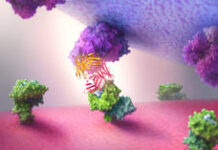Chemotherapy has a wide range of side effects, including fatigue, hair loss, and brain fog. Fast-growing cells throughout the body are targeted by this treatment, which can in turn damage digestive tract cells, as well. A new study says breast milk could be helpful in minimizing those digestive side effects.
Researchers from Vanderbilt University had been studying how compounds in breast milk can make the gastrointestinal systems of infants healthier than formula does. As they investigated this, they wondered if the same compounds in breast milk could in turn address damage to the digestive system in chemotherapy patients. By using a type of sugar found in the milk, they discovered that it may do just that. The findings can be read in the journal Cellular and Molecular Gastroenterology and Hepatology.

The particular issue this study aimed to address was inflammation known as mucositis, which destroys epithelial cells. Epithelial cells are tasked with digesting food, absorbing nutrients, protecting against pathogens, and continuous cell renewal and cell death which helps eliminate damaged cells. The destruction of these cells can lead to ulceration in the upper digestive track and the small intestine.
Steven Townsend, research team member and associate professor of chemistry at Vanderbilt, explains, “Intestinal mucositis is a well-kept secret. A vast majority of patients receiving chemotherapy experience inflammation in the gastrointestinal tract lining, but there are no effective treatments for the condition.”
Article continues below
Our Featured Programs
See how we’re making a difference for People, Pets, and the Planet and how you can get involved!
Along with Fang Yan, research professor of pediatrics and cell and development biology at Vanderbilt, Townsend discovered that the breast milk sugar 2′-fucosyllactose helps address the damage caused by mucositis. The team administered the sugar to mice with intestinal mucositis, finding that it prevented the death of epithelial cells. The hope is that this can ultimately be used to help cancer patients struggling with digestive discomfort.

Townsend also stresses such a treatment’s safety, explaining, “Babies consume 20-25 grams of these compounds a day from breast milk. There is no toxicity associated with the aspect of breast milk.”
The researchers acknowledged some limitations to the study. One concern is that overuse of breast milk sugars could lead to bacteria that are resistant to the effects of 2′-fucosyllactose in infants. This is because these milk sugars also act as antibiotics. Townsend hopes to minimize this possibility by finding other sugars that can work in the same way. He’ll begin by looking at the other 200 sugar compounds in breast milk.
With further research, there is hope that this treatment could be used for patients living with other conditions, including inflammatory bowel disease.

![]()
Provide Mammograms
Support those fighting Breast Cancer at The Breast Cancer Site for free! →
Whizzco Source






